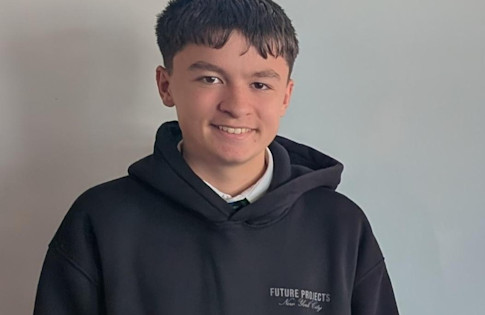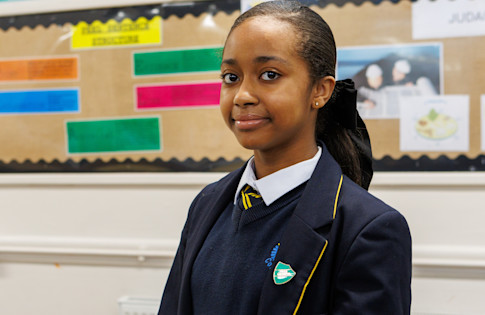Impact Report 2024/25: The Skills That Matter

An estimated 7.3 million UK workers (18%) still lack digital skills, critical for work. With upskilling staff a top priority for employers, how do we close this persistent gap to ensure every young person leaves education with the skills to harness technology to shape their future?
In the Pearson Schools Report, 2025, Janeen Hayat, Director of Collective Action, The Fair Education Alliance, said:
“Our education system cannot continue to play catch-up with advancements in technology and the workplace – we must put the foundations in place to equip every young person with the skills they’ll need to thrive.”
Essential skills are also fundamental. The Shadow Curriculum Review (sCAR) recommends that:
“Formal education should better support the civic, social, and emotional development of children and young people. Currently, we see students graduating with the grades but not the skills required by employers, nor broader competencies needed for them to thrive in life.”
Integrating essential skills such as teamwork and problem solving into the curriculum does more than simply boost engagement. We believe these essential skills underpin the adoption of digital skills - young people won’t thrive with tech if they can’t collaborate, adapt, solve problems or think creatively.
With the advancement of AI, it’s more vital than ever that we make essential skills development accessible to all young people, especially those from less advantaged backgrounds. The Essential Skills Tracker report 2025 found that people with higher levels of essential skills have been the first to adopt AI, but there’s a risk that a new barrier to social mobility is emerging. According to Skills Builder Partnership:
“Their higher levels of essential skills, which are highly transferable, will make transitions into new roles easier. It’s therefore possible that the AI wage premium will grow further and those with lower essential skills, who use AI less, could be at a significant disadvantage."
Our approach
While not every young person needs to be an expert in writing code, all young people - particularly those from less advantaged backgrounds - should have the opportunity to develop the skills and knowledge to know they can create change with technology and AI for the benefit of their community.
As part of our introductory computing courses which teach computing in a context, we inspire young people to become digitally informed and socially engaged citizens. They build their programming skills through designing and building their app prototype and develop their essential skills by working in a team, leading their own learning, and sharing their ideas with Industry Volunteers for feedback. Many enter our annual Showcase, competing nationally to pitch their ideas - imagining they are taking their app to market.
Apps for Good students learn essential skills that provide a solid foundation for bringing their digital skills to life. We use the Skills Builder Universal Framework to ensure that all sessions within our courses are designed to target the development of one or two essential skills. All eight non-technical essential skills from the Framework, categorised under communication, creative problem solving, self-management and collaboration skills, are covered at some point in the course, and our three core courses are accredited by Skills Builder at Impact Level 3: practising essential skills. This year we also gained Bronze Award accreditation from CREST, giving educators the confidence that our resources align with a nationally respected STEM scheme, developing research skills, allowing students to work like real technologists to design their own project.
Our impact on skills


Our 2024/25 impact data shows that Apps for Good courses continue to support the development of the skills in our Theory of Change for the majority of students. 66% of those that completed our feedback survey at the end of the course agreed that their essential skills had improved as a result of taking part, and 61% felt more confident in their computing skills at the end. Teachers are convinced of the impact the course has on their students’ skills development, with all respondents to our teacher survey observing improvements in essential skills and at least one aspect of computing.
We spoke to Somaira Younis, a delivering teacher at Shireland Collegiate Academy, after one of her student teams pitched their idea to judges as part of our 2025 Showcase. "Even if they don't win,” she said, “what they've achieved is a win in itself: working as a team, being able to problem solve, being able to use technology. They've achieved so much in such a short time via this programme.” Computer scientist and entrepreneur, Joysy John MBE, who supported the computing offer at Parliament Hill School this year and delivered our AI for Good course, picked up on the practical application of computing skills, and the chance to develop them: “The main benefit for students is to actually get some practical experience of using technology to solve problems and building that digital capability”.
These teachers’ observations are echoed in the qualitative data we gathered from students via interviews and focus groups during the year. When we asked them what skills they’d developed, the essential skills of Teamwork, Speaking, and Problem Solving came through loud and clear. Many students also referenced how much they’d enjoyed the computing aspects, commenting that they’d got better at coding. This is reflected in the survey data, where 72% of student respondents said that they’d enjoyed designing and building their app prototype. Three students describe how they experienced that impactful combination of developing computing skills alongside essential skills:

I was never really good at problem solving, but I think since starting this my problem solving skills have been getting a little bit better...Before we started on this, I'd only done coding once in computing. As we did it more, the more enjoyable it was.”
Daniel, S4 student at St Paul's RC Academy

Working with other people is a bit of a struggle for me. I like talking to people that I actually know, so I think it helped me get to know more people...I learned coding skills because we did an App Lab session on code.org - that was very cool to learn.”
Sienna, Year 7 student at Connaught School for Girls

I've learned to really listen to the rest of my group and find different ways and solutions to satisfy all of us ... I realised that there's more to computing than just sitting in front of a computer all day.”
Zi Nan, Year 8 student at The St Marylebone CE School